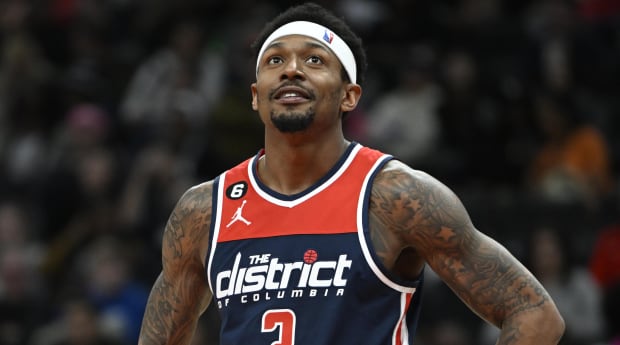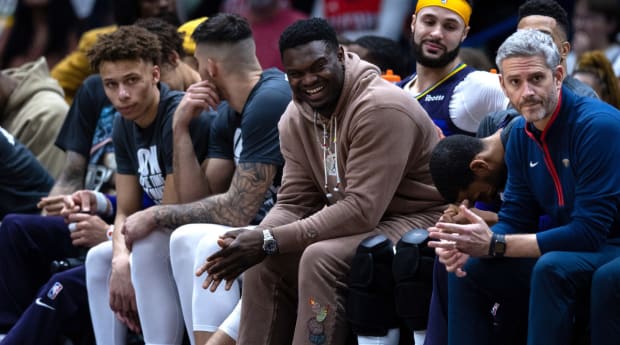Unpacking the latest rumblings ahead of Thursday’s NBA draft …
Is it reasonable to believe that Sunday’s agreed-upon trade that will send Bradley Beal to Phoenix is a bad deal for both teams?
On paper, Phoenix acquiring Beal, a former All-Star—albeit one with injury issues, which we’ll get to in a moment—feels like a win. The Suns were already planning for a post–Chris Paul future and swapping Landry Shamet, a back-of-the-rotation player, for a scorer like Beal is a no-brainer. Getting a deal done without a first-round pick—Phoenix, by virtue of some of the wheeling and dealing it has done the past few years, didn’t have one to trade—and without including DeAndre Ayton could be viewed as a masterstroke.
But …
While the Suns now have an enviable scoring trio of Beal, Kevin Durant and Devin Booker, and Ayton around to backstop Frank Vogel’s defense, that’s about all they have. At the moment, Phoenix has just six players under contract for next season. Cameron Payne projects as the team’s starting point guard. The Suns will begin next season with a quartet of players making around $160 million and a bunch of guys on minimum contracts.

Brad Mills/USA TODAY Sports
That’s generally not a formula for great team success.
The fit appears awkward, too. Beal takes a lot of midrange shots. Just like Devin Booker. Just like Kevin Durant. Booker and Durant double as reliable three-point shooters. Beal, strangely, has regressed as a three-point shooter. He shot at least 38% from three-point range in each of his first five seasons. Over the past four, he has cracked 36% once. He’s also a high-usage-rate player. In 2020–21, when Beal averaged 31.3 points over 60 games, his usage rate was 34.1, third highest in the NBA. On a team with Durant and Booker, he will have the ball a lot less.
Phoenix has also tied itself to a collection of fragile stars. Durant, who will be 35 before the start of next season, has a well-documented history. Beal has played 60 games just once in the past four seasons. COVID-19 issues and pandemic-shortened seasons were a factor, but he needed wrist surgery in 2022 and dealt with hamstring issues last season. Beal’s ability to stay on the floor is a legitimate concern.
And by tied itself, I mean superglued. The Suns are all-in now. Beal is under contract for the next four years, and that no-trade clause that made the last few weeks so challenging for Washington remains active. Durant is tradable but not for nearly the kind of package Phoenix gave up for him. For better or worse, this team has tied itself to Durant, Booker and Beal.
It will be worth watching what the Suns do with Ayton. Vogel wants to coach the former No. 1 pick—Vogel’s top-rated defenses in Indiana and Los Angeles were all built around interior muscle—but it’s widely believed Phoenix will consider Ayton-centric deals over the next few days that would yield multiple rotation players in return.
Now, for the Wizards …
It’s fair to say the end of the Beal era has been a catastrophe. They refused to move him in ’22 when it was clear the team was going nowhere, gave him a five-year, $251 million extension when it wasn’t entirely clear who they were bidding against and sweetened the deal by handing Beal a no-trade clause—the NBA’s only no-trade clause.
Think about that: Beal has what Nikola Jokić, Giannis Antetokounmpo and Joel Embiid do not.
They finally do move him and come away with … what, exactly? A decent role player? A handful of second-round picks? They have, effectively, given Beal away. Which makes you wonder—what was the rush? The Beal era needed to end, but it was more important that the Wizards figured that out than rushing to end it. They didn’t pick up any first-round picks—did they need to do a deal before the draft? Beal’s no-trade clause limited who they could talk to—could there have been value in holding on to Beal into the summer, even into next season, to see whether Beal would expand his list? The new collective bargaining agreement, set to begin July 1, would have complicated things. But it’s hard to see Washington doing a deal that was worse.
And what about Paul? If the Wizards can’t find a third team that wants Paul to participate in this trade—and that is the reason this deal isn’t official yet—there will be pressure on Paul’s camp to cut him loose. That would be a mistake. What is Washington’s incentive? To do right by Paul? To save a few extra bucks? Paul is 38 and showed signs of decline last season. But the Wizards can bring Paul to training camp, hope he plays well early and then see whether a team desperate for a playmaker—they are always out there—comes calling to offer value back.
Maybe Beal clicks with Durant and Booker. Maybe the Wizards use the new flexibility to make some smart signings and hit on one of the second-round picks. Maybe it will be a win-win. But right now there appears to be just as good a chance that it’s a lose-lose.
Why didn’t Miami get more aggressive in the pursuit of Beal?
That was among the questions many around the league had in the aftermath of the Wizards dealing Beal to Phoenix. Miami has a quality young player in Tyler Herro, a significant expiring contract in Kyle Lowry and multiple first-round picks to deal.
The Heat likely could have topped Phoenix’s offer. So why didn’t they?
Among the reasons are that Miami has eyes on a different prize: Damian Lillard. There is intense league-wide interest in what the Blazers will do this week. Portland holds the third pick in Thursday’s draft and right now are showing no interest in dealing it, sources say. The Blazers have been burning up the phone lines looking for upgrades that will satisfy Lillard—Toronto’s OG Anunoby and Pascal Siakam are two players they have discussed, per sources—but to this point have rebuffed overtures to trade a pick that will position them to draft either G League star Scoot Henderson or Alabama big man Brandon Miller.
So what happens if the Blazers can’t find a deal that improves their short-term chances? There won’t be a trade demand; that’s simply not Lillard’s style. Lillard has said repeatedly—including to me back in March—that if Portland can’t put itself on a path to contention, he will sit down with GM Joe Cronin and have a frank discussion about what is best.
From my interview with Lillard in March:
“There comes a time where we have the right intentions, [but] we’ve got to execute. We have to actually make that come to life, to give ourselves a chance to really make a run at it. And because of who I know [Cronin] to be, I trust him on that. I don’t ever think he would tell me one thing and then not do it. If anything, it would just be like, ‘We did our best and we couldn’t do it.’
“I think I’ve always been firm in my commitment to what I want and to this organization, and that’s where it stands right now. But like I said, if it comes time where they say, ‘Man, we can’t get it done, maybe it’s time for us to turn a page,’ I don’t think that will be the case, but we’ll see. Right now, all I know is I want to win.”
Miami is among the teams waiting to see whether Portland makes Lillard available. Lillard, 32, is under contract for the next three seasons with a $63 million player option for 2026–27. And while Lillard doesn’t have a no-trade clause, the Blazers won’t just ship him anywhere. Still, the return for Lillard would be significant. He’s a proven playoff performer who averaged a career-best 32.2 points per game last season. Miami would throw every asset it had at Portland to land Lillard. New York and Brooklyn are expected to be aggressive, too. Cronin is doing everything he can to give the Blazers a chance to win with Lillard on the roster. If he can’t, we could finally reach the point where Lillard and Portland part ways.

Stephen Lew/USA TODAY Sports
What is going on in New Orleans?
Over the past few days teams have been checking in with Pelicans officials to see how available Zion Williamson is—and exactly what the price would be. There has been plenty of friction between Williamson and the Pelicans over the past two years, and injury issues have robbed Zion of most of the last two seasons. But Williamson is 23 and two years removed from averaging 27 points with a true shooting percentage of 65%. And he is under contract for the next five seasons.
Would the Pelicans really move a player like that?
The short answer: In the right deal, yes. New Orleans, as The Athletic has reported, has been discussing ways to land a top-three pick, with Henderson as the target. There appears, though, to be stronger interest league-wide in Brandon Ingram, the Pels’ 25-year-old former All-Star. There’s little appetite in New Orleans to move Ingram, sources say.
Best guess here is Zion stays put and the Pelicans try one more time to keep him on the floor. Remember: New Orleans was 23–14 when Zion went out with a leg injury in early January. Zion averaged 26 points per game. He’s a dominant interior scorer who will unlock more parts of his game in the years ahead. He’s not untouchable, which in itself is a development, but it seems unlikely New Orleans will find an offer in the next few days worth parting with its oft-injured star.







